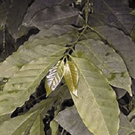Effects of Caffeine and Chlorogenic Acid on Propidium Iodide Accessibility to DNA: Consequences on Genome Size Evaluation in Coffee Tree

Compare with care: caffeine may affect your judgement
Measurement of nuclear DNA content (C-value) is one of many tools used in study of plant evolution, in evaluating sexual and somatic hybrids and in assessing tissue cultures. Flow cytometry of propidium iodide-stained nuclei has become the method of choice and, as with many colorimetric or fluorimetric methods, it is subject to inter-experiment variation; careful use of standards is therefore absolutely necessary. However, even the use of standards may not eliminate significant error, as shown by Noirot et al., from Montpellier and Lusignon, France and Man, Ivory Coast, (pp. 259-264). They are working on inter-specific and inter-variety hybrids of coffee (Coffea). The different lines they use vary in their content of caffeine and of chlorogenic acids, and it is clear that both can affect measurements of DNA C-value. The authors first examined the effect of adding either caffeine or chlorogenic acid to the Petunia hybrida nuclei used as a standard. Caffeine increased the fluorescence of Petunia DNA, suggesting that it allowed a greater access of the propidium iodide dye, while chlorogenic acid decreased the fluorescence. They then showed that when P. hybrida was used as an internal standard (tissue processed together with the Coffea tissue), the estimated genome size was always different from the estimate obtained when the Petunia was used as an external standard. This difference they refer to as DeltaDNA. The DeltaDNA value was affected mainly by the caffeine content. This varied both within hybrids (affected by developmental and environmental factors) and between hybrids. However, chlorogenic acid also affected the DeltaDNA; furthermore, the relationship between estimated DNA C-value, caffeine content and chlorogenic acid content was complicated by the interactions between caffeine and chlorogenic acid. As the authors point out, stoichiometric errors in estimating DNA are very likely to occur in any plant where the phenolic content is variable: interpret the data with care.
University of Exeter, UK
j.a.bryant{at}exeter.ac.uk